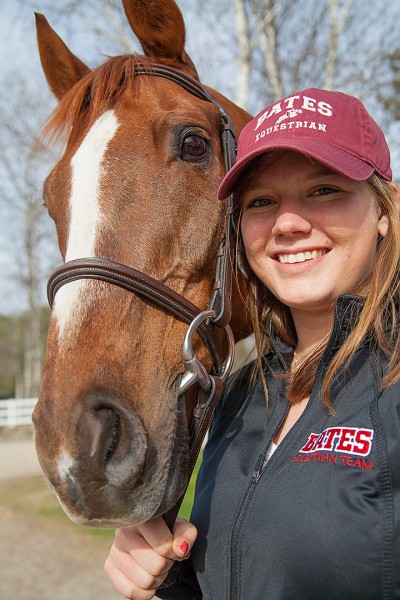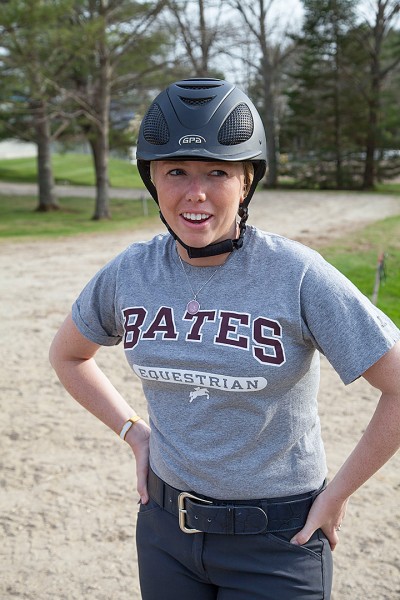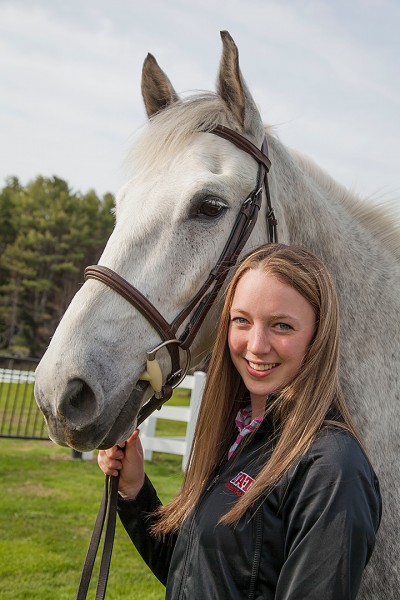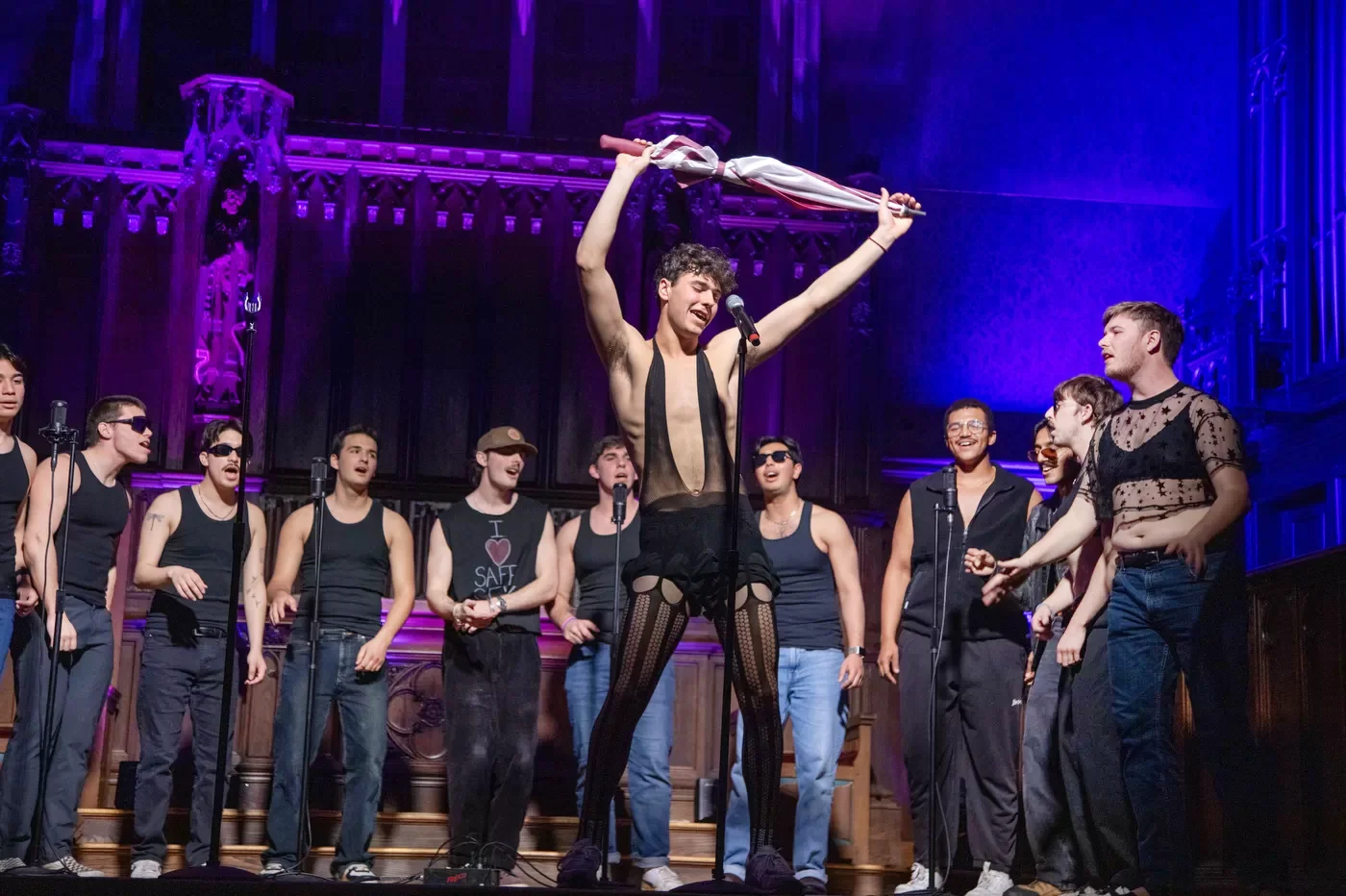
Equestrians Kirwin ’15 and Kiesler ’16 ride to top-10 finish at Nationals
As Katie Kirwin ’15 maneuvers Otis into position for a photograph, the agreeable grey gelding responds willingly to her gentle nudges.
The photo shoot is uneventful until Otis steps on Kirwin’s foot. As Kirwin winces, you get a quick insight into what goes on between rider and horse.
Like any relationship, it can be unpredictable.
For Kirwin and fellow Bates Equestrian Club member Hannah Kiesler ’16, the ability to manage equine unpredictability is a big reason the pair landed in the top 10 of the recent Intercollegiate Horse Show Association National Championships in Harrisburg, Pa.
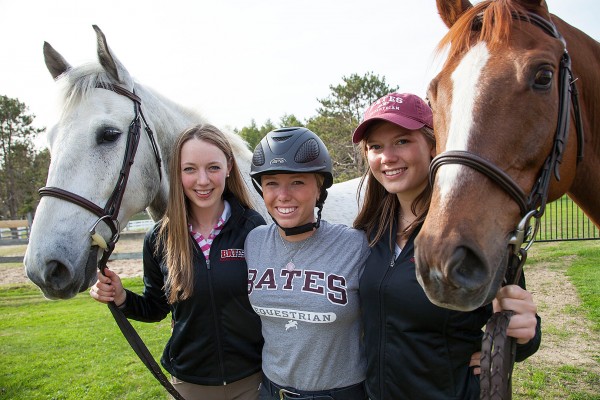
Otis (left) and Juno (right) flank Bates Equestrian Club riders Katie Kirwin ’15 (co-captain), Carolyn Attenborough ’15 (co-captain) and Hannah Kiesler ’16. Kirwin and Kiesler landed in the top 10 at this year’s national horse show. (Photographs by Jay Burns/Bates College)
Kirwin, a team co-captain, was seventh in intermediate equitation over fences, and Kiesler ninth in novice equitation over fences. (More on those terms later.)
“For both of them to place in the top 10 at Nationals is an amazing accomplishment,” says second-year coach Ginger Klingenstein-Albert, who, with her husband, Mike, owns Venture Farm in nearby Pownal, where a dozen or so members of the Bates club do their riding.
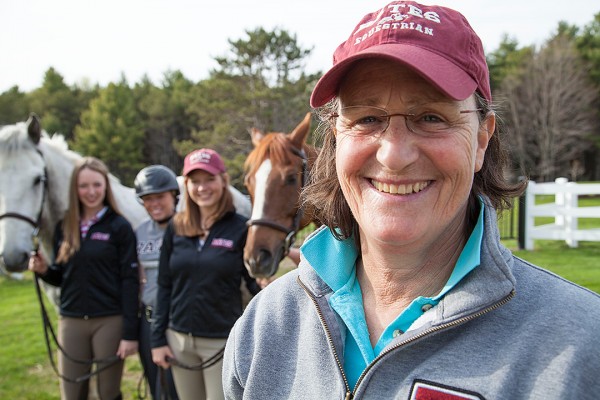
Club coach Ginger Klingenstein-Albert says placing two riders in the top 10 at Nationals “is an amazing accomplishment” for Bates.
“Of the 10,000 collegiate riders from 400 colleges that start any given year, only about 400 riders qualify for the IHSA Nationals,” she adds.
“It’s especially amazing considering Katie and Hannah competed against riders from varsity programs who are coming out of the national junior ranks.”
“Equitation” is the name of this equine sport. Unlike categories of competitive riding that emphasize the horse’s ability (like hunter and jumper), equitation “focuses on how well the rider performs over a course,” says co-captain Carolyn Attenborough ’15, a politics major from Manchester-by-the-Sea, Mass.
One class of equitation has small jumps (“equitation over fences,” Kirwin and Kiesler’s event) and the other doesn’t (“equitation on the flat”). Each class has novice, intermediate and open ranks.
At a show, horses are assigned to riders by draw. Even if a rider’s horse is having a bad day, it’s still possible to score well.
“It depends on how you deal with the situation,” says Kirwin. “At one show, an Endicott rider had a big white horse that bucked throughout the course. But every time the horse bucked, she dealt with it calmly, and she won the class. The judge rewarded the rider.”
As with other equine sports, the human and horse adjust to each other’s unpredictable natures — and yes, just as we humans consider horses to be unfathomable, horses can find their riders to be confusing.
While Otis stepping on Kirwin’s foot was just an unpredictable mistake, not an act of insolence, it suggests another way that a horse is less like a piece of equipment and more like, well, a teammate.
“A lacrosse stick isn’t going to vary day to day,” says Kiesler. “But a teammate will have good days and bad days, so you have to be ready for a variety.”
What it’s like to work with horses (or, why they’re not like a piece of sports equipment)
Attenborough puts it another way. “We work with our horses instead of using them. It’s a partnership.”
The point is, Kirwin says, you have to be attentive and mindful of the animal’s quirks while you both try to perform at a high level.
“Riding gives you empathy [combined] with perfection and discipline,” she says. “You have both at the same time.”
Kirwin, a biochemistry major from Eliot, Maine, and Kiesler, an environmental studies major from Glencoe, Ill., are the first Bates riders to quality for the IHSA Nationals since the Bates club formed in the 1990s.
To qualify for Nationals, a rider must finish first or second in his or her riding category at one of eight zone championships around the country.
Bates is Zone 1 (New England), considered one of the most competitive IHSA zones.
At the zone championships in April at Mount Holyoke College, Kiesler was champion of her riding class and Kirwin was reserve champion, meaning overall second place.
At Nationals, Kirwin faced the ultimate challenge when her horse refused to jump a fence that’s about as tall as a folding TV tray.
That’s not exactly the rider’s fault, yet “it usually means an automatic low score,” Kirwin says.
“A few years ago that would’ve completely flustered me,” she adds. “I would’ve lost my focus and not have been able to continue.”
Kirwin handled this refusal “eloquently,” says teammate Kiesler. She circled her horse back for another try, making sure he was “between both hands and legs,” using leg and hand pressure to keep him balanced and attentive.
The pair got over the jump and “finished the course beautifully.”
The judges rewarded her horsemanship by granting a rare “re-ride,” offered when a capable rider is victimized by a horse that’s having a bad day.
The Bates riders say that a “keep on keeping on” mindset comes from their coach.
“Ginger has helped with my perseverance,” Kiesler says, “with the idea of keeping going no matter what. And that’s been helpful in my whole, entire life.”
“She has very high expectations,” says Attenborough, “but that because she wants what’s best for the horse and for the rider. And at the end of the day she’s your best friend.”
